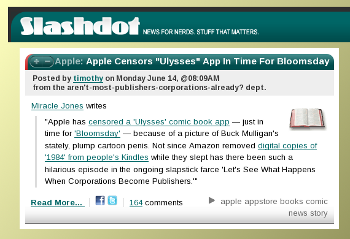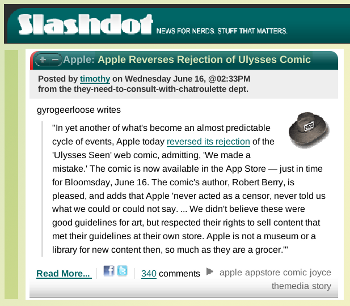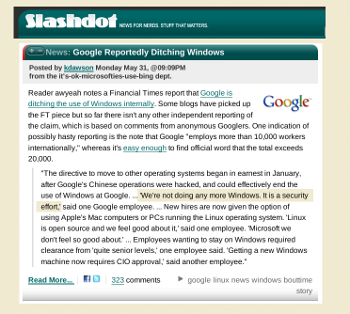This past week saw the latest gadget release from Apple, including version 4 of the iPhone. I read these related articles about Apple's strategy and how they continue to "support" developers who work on their iPhone platform. If you play by their rules, then there's a pot of gold waiting at the end of the rainbow. But there is not so much gold as heartache if you run afoul of the lords at Apple- read more below. |
Molly Wood
Neil McAllister
|
Apple = Microsoft 2.0Jobs came back to Apple like a prophet from the wilderness. He brought them back from the abyss. I and a lot of other people had written them off, but they rose from the ashes by embracing a unified hardware/software platform, with hardware manufactured only by Apple. Their new software platform,
OSX, is a Unix-based technology; Darwin uses FreeBSD at the core. You've really got to give it to Jobs! He saw that the BSD license would allow him to take the best of the technology and never have to give anything back, or only when he felt like it. And if you didn't notice, the days of anything coming back from them are gone. Now, Apple is widely considered to be the leading tech company, leaving Microsoft in their dust. Microsoft is the new IBM, the slow, stodgy company that Gates/Ballmer wanted to avoid at all costs. Too bad the DOJ didn't follow through with the planned breakup of Microsoft. As smaller, more focused entities, they'd be better positioned to compete now. There are very few scenarios where a unified Microsoft makes the most sense, and we're not living in one of them. (Coincidentally, the breakup would have likely meant more money in the long run for Microsoft's "baby bells".) For sure, the path that led us through Vista is not among those that make sense/money. It cemented the fact that Microsoft's software release strategy is much too slow to compete. It also left the software market as something that was "Microsoft's to lose." They've lost it, and handed off to a new incumbent monopolist: Apple is the new Microsoft.
But no matter the different origins, they're now more alike than different. Regardless of the messenger, Gates/Ballmer or Jobs, the message remains the same: Don't get in the way of the 900 lb gorilla! They're now both following a monopolistic business plan. Apple defeated Microsoft because Jobs has two big advantages over Ballmer. First, he blends in better, chameleon-style. Is Jobs part of the establishment, or anti-establishment? It's hard to tell, but either way, it gives him his second advantage, just "looking cool." No one thinks
monkey dance boy Ballmer is cool under pressure. But Jobs, in his disguise, the wolf in sheep's clothing, gets to tread in territory that Ballmer can only dream about. Gates/Ballmer ended up in antitrust court over cutting off the air supply of a little upstart company, Netscape. But since Apple is not a monopoly (in terms of absolute market share), it is free to lock out the giant Google, keep Opera at bay, and not worry too much about any of the little guy's toes. Apple developers better be prepared to run their gauntlet- and on Apple's titled table.
One thing is for sure, Ballmer is monstrously jealous of Jobs. First, Apple passes Microsoft in total market cap- and size matters! Second, Apple has the total device lock down which requires the "mother, may I?" approval from Jobs that Ballmer could only dream of. And finally, Jobs gets to stand up there on stage wearing levis with a twelve-foot high backdrop appealing to "Developers" and he never even breaks a
sweat.
Luckily one choice remains and is the last hope to avoid the one-vendor lock in and monopolist lockout. Monopolies have a limited playbook. Choose the infinite, open platform instead. Choose GNU/Linux. |
 |
 headline.
headline. headline.
headline.
 headline.
headline.